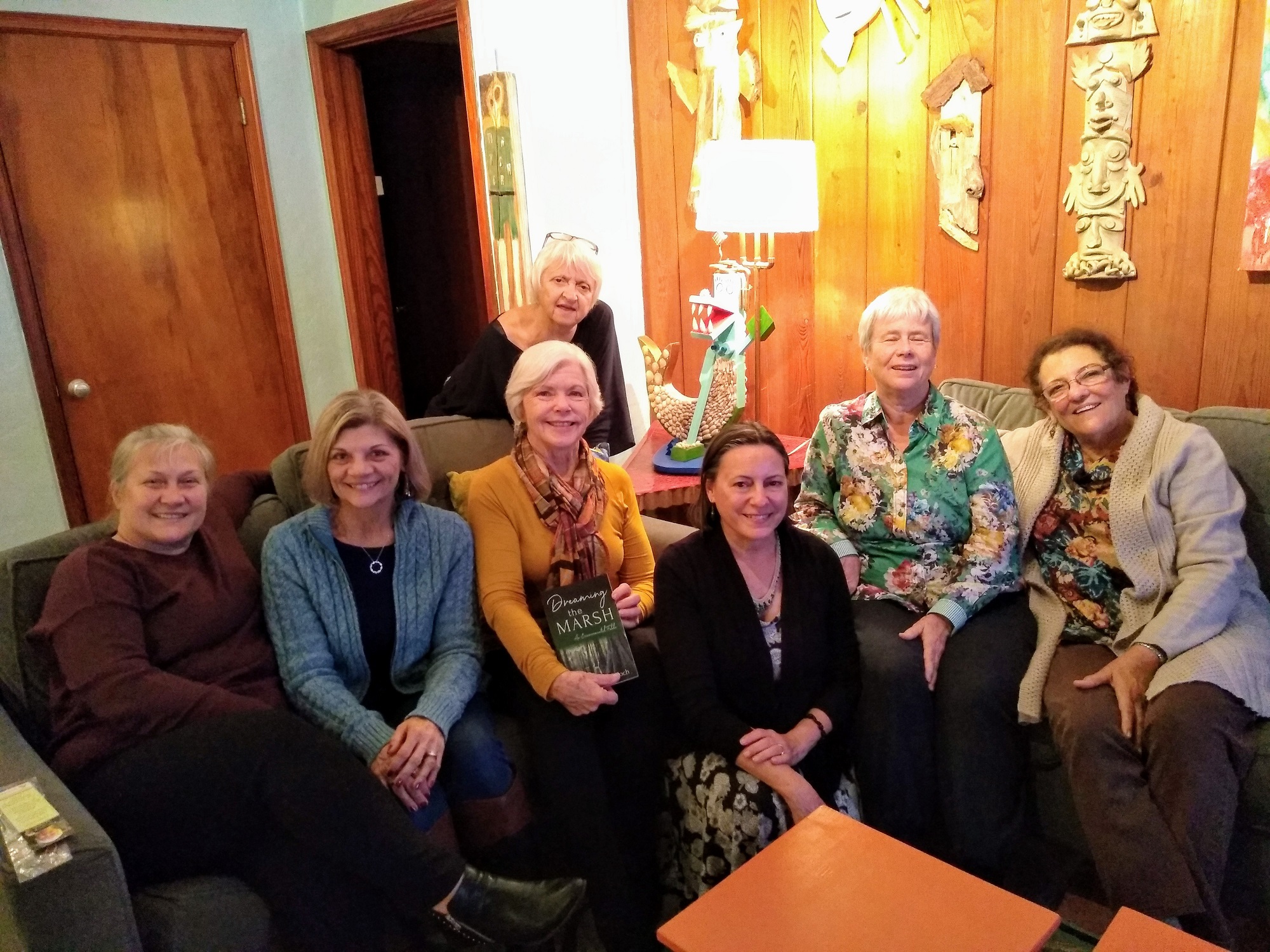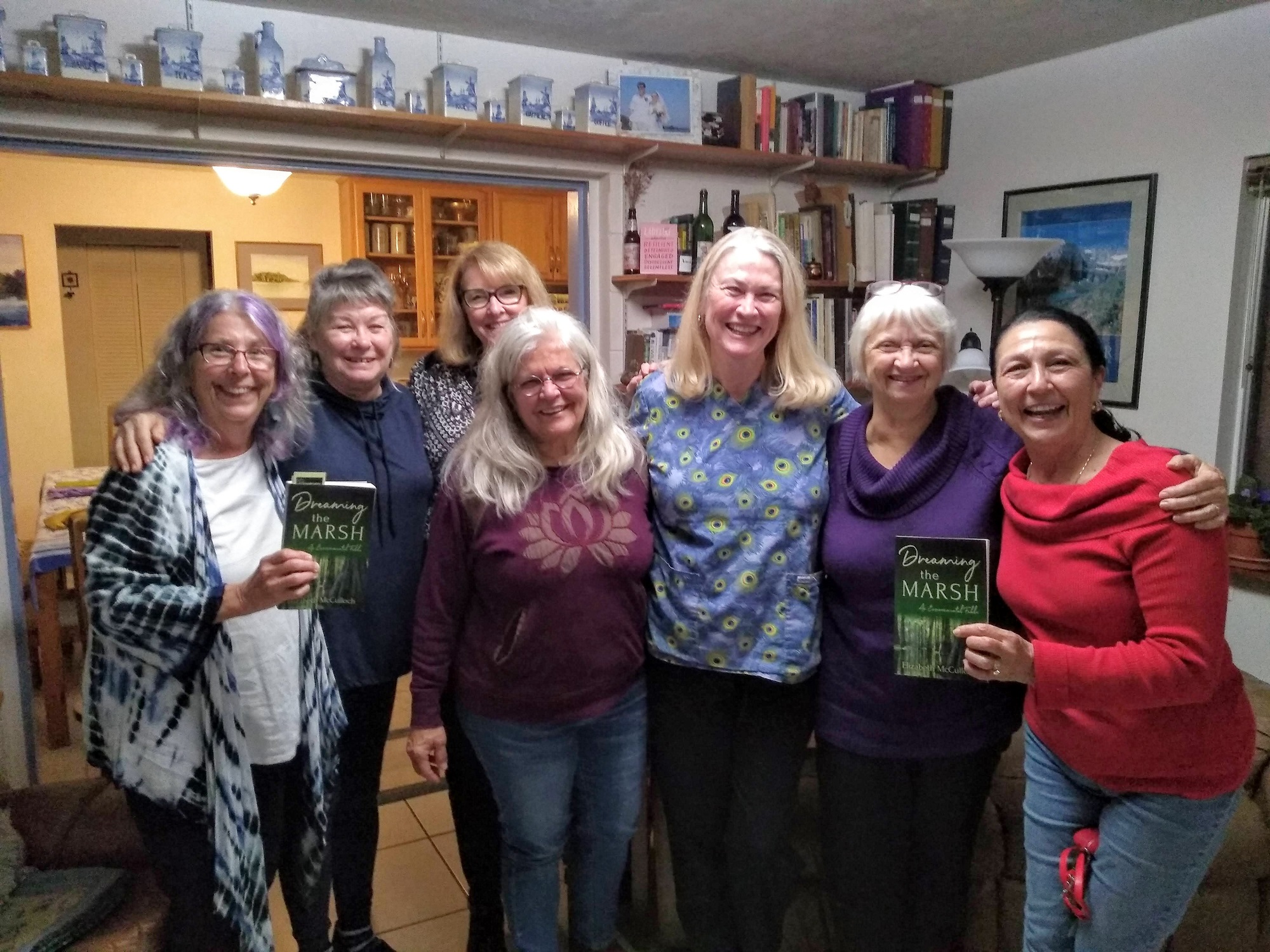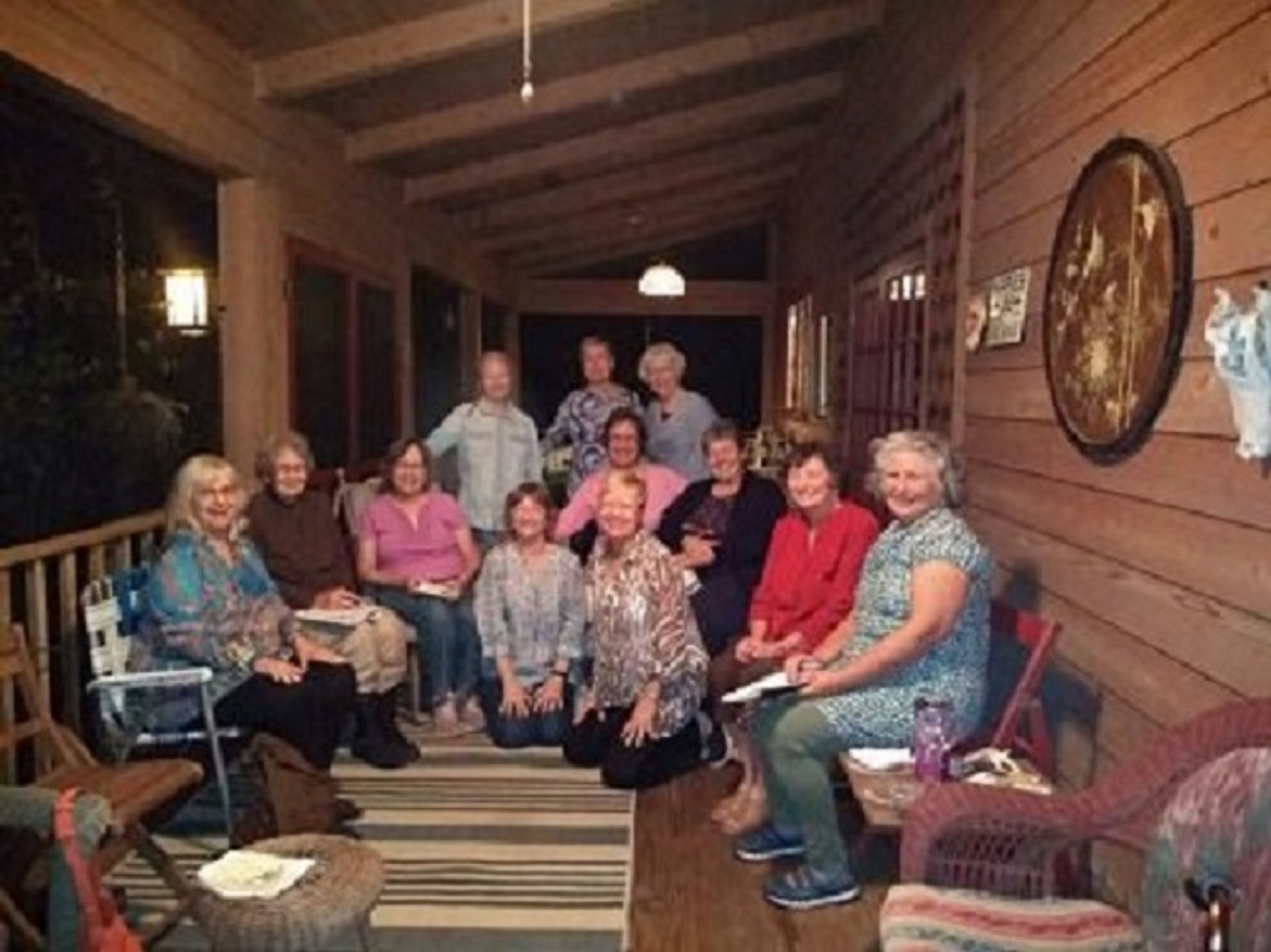For Book Clubs



I love meeting with book clubs. Most of the people have read the book and want to talk about it, and I learn a lot (once somebody pointed out something cool in my book that I didn’t know was there!) I can drive most places in Florida or Georgia, or if you’re just too far away, we can arrange a zoom meeting. You can email me to arrange a visit, mcculloch1947@gmail.com, subject matter “book club.” Whether or not we meet, if your club adopts the book I’ll be happy to mail you bookmarks for each member.
Get the Book
To support independent bookstores you can order the book online at bookshop.org. You can also order it from twistedroadpublications.com, or wherever you buy books. The Alachua County Library has ten copies of Dreaming the Marsh in a book kit – a rolling suitcase that book clubs can check out.
Welcome
Hi! Thanks so much for considering Dreaming the Marsh for your book group. Here is a description of the book and an excerpt to help you decide, as well as questions and answers you might use to get a discussion started. I’ve also included a brief bio.
In Brief
Dreaming the Marsh is eco-fiction, an environmental fable that is uniquely Floridian. Mother Nature has had enough and a day of reckoning is coming, foretold by words that mysteriously appear on the side of a shiny new building. When the reckoning arrives, in the form of a giant sinkhole that swallows the site of a planned development, a large lake, and several miles of interstate highway, the citizens of Opakulla, Florida struggle to understand what is happening. A geologist wants to study it, the developers relish its wild beauty, and the mayor plans to stop it. Only the owner of a local café, who speaks with the Ancients, understands it, and she isn’t telling. Infused with nature and magical realism, Dreaming the Marsh will find admirers among readers of Delia Owens and Karen Russell.
Excerpt
DREAMING THE MARSH
by Elizabeth McCulloch
Chapter One
The sun popped up there at the edge of the world, stretching long warm fingers across the Marsh, erasing the frost, sprinkling light on the spiders’ invisible webs. It sent the shadows of high grasses onto the empty highway, and spread across the sleeping town, greening the tops of the tall pine trees. It lit the roof of the new Commission building and slipped down the sides, firing the windows and warming the sandstone to a rosy glow.
Tyler Waites, cycling south on Ashley Avenue, fingers chilly in his gloves, saw the burn and glow and let it warm him. As he came nearer he slowed and stopped. Vandals had been there already. He rode closer until he could read their writing over the burning copper-clad doors.
Deep down and under
Up to the sky
Shining and plunder
The well runs dry
Odd words for graffiti, and oddly-formed letters, hinting of Cyrillic or Greek. The paint had been carefully matched to the sandstone; the writing was like shadows on the wall. Tyler rode on, pedaling in the rhythm of the rhyme.
Ashley Avenue became a gravel road just outside the city limits, and then the road ended, and he was riding on a dirt track into the woods. When he came to the fence, he laid his bike down under a tree and climbed over the sagging barbed wire, following a faint trail to the edge of the Punchbowl, an ancient sinkhole. He liked to be there just after sunrise, alone with the squirrels. He pulled a poncho from his day pack and spread it at the rim of the sinkhole to keep his pants dry.
Tyler was born in Opakulla, and his family had lived there until he was fifteen. As boys, he and his friends would slide down the Punchbowl on pieces of cardboard, then clamber back up through the brush and vines to slide down again. At dusk, chased by mosquitoes, they returned home scratched, bruised, and happy.
His sinkhole days had led Tyler to study geology, and in the end, The Punchbowl had brought Tyler back to Opakulla. Though he went to college in Cambridge and grad school in Ann Arbor, he had never felt at home up north. The people he knew in those college towns were all alike. They all had the same opinions, and it made them smug and oblivious. He shared the opinions, but never without doubts, remembering all the people in Opakulla who would disagree with them.
Politics aside, north was cold, and he could never get used to it. He loved the gentle winters and fierce summers of Florida. The wide peninsula drooped down from the continent, a world of its own. Its occupants thought they could stop the ocean from washing away its shores, the ground from collapsing beneath them. His dissertation on sinkhole formation had brought him offers from Berkeley and Princeton, but he had turned them down to come home to Opakulla University.
Now the ancient sinkhole was a state park. A wooden boardwalk led halfway around it to a flight of 230 stairs, all the way to the bottom. It was the only public access to the Punchbowl, but the Park Service allowed Tyler to go wherever he liked.
He sat huddled against the chill of the woods still empty of sunlight, his arms wrapped around his legs and his chin on his knees, gazing out across the sink. It had caved in a thousand years ago. Now it was a deep bowl full of trees, with bubbling springs trickling down the sides. Swampy tupelos grew next to sandhill pines, rattlesnake ferns in the deep shadows of chestnut oaks. Sitting on the rim, he felt like a monkey perched in a tree, with the sky down close on top of him.
It was almost 7:30 when Tyler stood up, shook the leaves out of his poncho, and walked back to the fence to retrieve his bike. When he arrived at Vernell’s Breakfast Bar, Jared Coggins was already there, and he and Vernell Potano were talking about her great grandson. Everybody knew about Curtis. He was the smartest boy in his class, but he couldn’t stay out of trouble. So far, the creativity of his pranks had convinced the juvenile court to keep him out of detention, but the judge was running out of patience.
Jared sat at a table. Vernell was washing down the counter with a wet cloth, rubbing harder and harder as she talked.
“He’s going to be the death of his mama, and he’s only thirteen.”
Tyler sat down with Jared, and Vernell brought his coffee.
“You going to have biscuits this morning,
“Yes, please.”
“Well, just hold on a minute and I’ll whip some up fresh for you.”
“Oh no, don’t bother, I’ll just have toast.”
“No bother. Do it now or do it later.”
Vernell’s had a rush around nine o’clock; old men who would sit around the rest of the morning until the lunch crowd drove them out.
“They’re dedicating the new Commission building today. Are you going down to hear your cousin make a speech?” Tyler asked Jared.
Tyler had known Jared since they were boys together, hunting snakes in the Marsh to sell to the biology lab at fifty cents a head. But now when they saw each other at Vernell’s, Tyler struggled to make conversation. Jared was shy, and his discomfort was contagious. He had grown up in Opakulla, and came back home as soon as he graduated from Georgia Tech. When HSI set up their southeastern headquarters in Opakulla, he took a job with their IT department. Working at HSI he should know plenty of people, but Tyler sometimes wondered if Jared had any friends besides him and Vernell. When he thought of it, the only other friend he had himself was Gerald Stone, and he didn’t want any others. Maybe Jared didn’t either.
“No. Marybeth isn’t the mayor anymore. Now it’s Randall Fairchild.”
Vernell was back from the kitchen with Tyler’s breakfast, grits and scrambled eggs. Tyler stirred them together and poured hot sauce on top. Vernell gave him the same look she always did.
Tyler and Jared were silent for a few minutes, eating. Then Jared said, “I saw your boss, Dr. Stone, on the television last night.”
“How did you like his speech?”
“It was a good speech, I guess.”
He seemed to be struggling with his mouth, gathering the nerve to say more.
“Actually, I thought he sounded a little full of himself.”
“Well, he’s been leading that battle for two years, and you know if it weren’t for him they never could have won against JJ Visions.”
“I don’t know, Tyler. What did they win? The owners will donate the swampy part of their land to the county, right up by the park boundary, but they couldn’t have built on it anyway. Now they can build that whole big subdivision, they get good publicity and a big tax break. Developers always win in Opakulla, and JJ Visions is going to destroy the Marsh.”
“Rich folks give away a swamp and poor folks praise their name,” said Vernell.
She was always saying things like that, as though she were the Voice of the Ancients. From anyone else, Tyler would have found it annoying. But Vernell was not like anyone else. He’d known her, only slightly, since he was a little boy. His father used to take him on a Saturday for a treat of Vernell’s homemade peach cobbler with ice cream. Now she had to be in her eighties; her skin was wrinkled as a shelled pecan and she had lost most of her teeth. But she still stood tall and straight, in the long bright caftans she always wore.
“We don’t know their name,” said Jared.
“Sure we do,” said Tyler. “The land is owned by that New York company. Wilson Trust Enterprises, or something like that. They’re the ones who hired JJ Visions.”
“But who are the people behind the Wilson Trust?” (excerpt ends here)
Discussion Questions
(I offer these discussion questions only as suggestions, a way to get started if you can’t think where to dive in. I can’t imagine you’d try to discuss them all.)
1. Is the Marsh a character in the book? Think about what attributes of a character it has, and what it lacks.
2. What do the story of the Marsh and the sinkhole have to do with the human plotlines? How do these natural events affect the human characters?
3. Does the combination of magic and realism work, or does it seem contrived? Are the magical elements integrated into the story?
4. The author is a white woman. Though she has no ties to Native Americans, she has invented myths about the earliest inhabitants of the Marsh. Is she entitled to make up such stories?
5. Marybeth has deep family roots in Florida, and resents “outsiders” coming in, changing things, criticizing, giving advice. Who is a native, who is an outsider in this book?
6. Prologues are unusual in fiction, and many readers skip over them. If you read the prologue, did it contribute anything to your understanding or enjoyment of the book?
7. Does this fictional account of a natural disaster, laced with magic, have any relevance to contemporary environmental issues?
8. Why does Carol choose as she did? Was this a wise decision? Do you think the relationship will last?
9. What led Gerald to suggest to his family that they acquire part of the Marsh for development? What do you think of his actions after that?
About the Author
Elizabeth McCulloch was born in Buenos Aires, Argentina, and lived in New England, the Midwest, Canada, and the South, before putting down roots and finding her home in Gainesville, Florida, almost forty years ago. Previously a lawyer, then a teacher, she has had children of various stripes: one born, two foster, one step, and the granddaughter she is now raising with her husband. Dreaming the Marsh is her first novel. Her blogs, The Feminist Grandma and Big Books from Small Presses, are at her website, elizabethmccullochauthor.com.